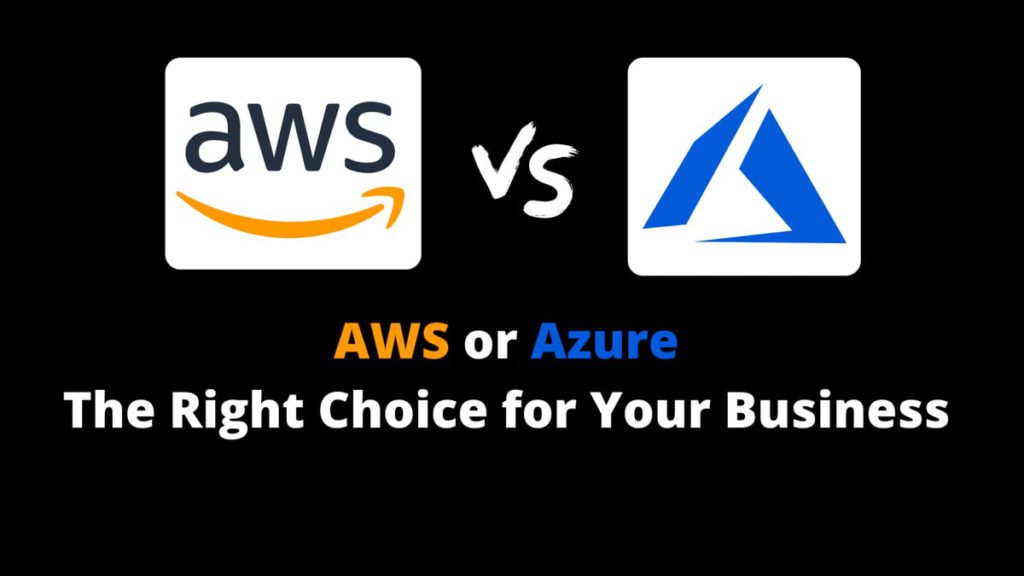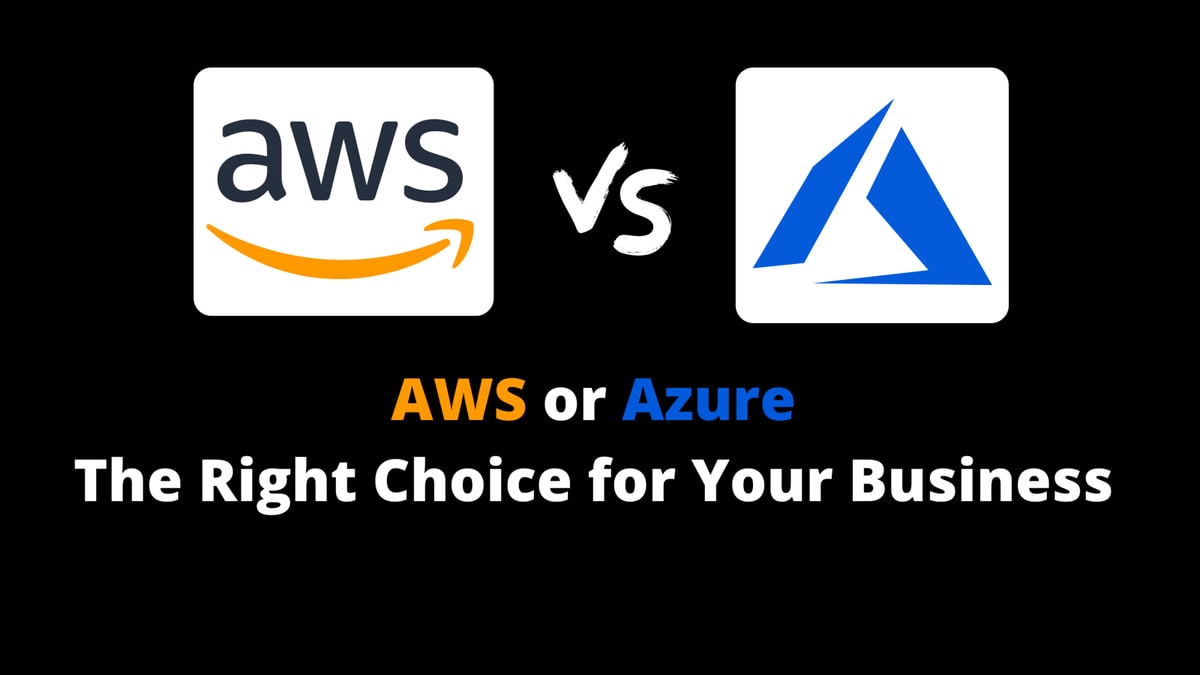Cloud service providers such as Microsoft Azure and AWS are more like heroes than anyone can imagine. Cloud storage companies affect the lives of millions; often to make the world a better place.

In the battle of AWS vs Azure, Azure and AWS are great heroes for their rights — but, who is on the cloud?
Looking up may lead you to believe that AWS has an unprecedented edge over Azure, but a closer look will prove that the decision is not so simple. In order to determine the best cloud service provider, one needs to consider many factors, such as the cost of cloud storage, the rate of data transfer losses, and data availability rates, among others.
From elementary schools to NASA, the clouds have touched every aspect of our lives. Who said superheroes are found in comic books?
Let’s start with knowing the winner of the AWS vs Azure battle.
AWS vs Azure: The origins of AWS
In the early 2000s, Amazon was forced to re-evaluate its development platforms as it took care of its customers from foreign companies. Over the years, they have created a vicious circle of IT infrastructure in which many teams working in archives — often doing the same tasks — without thinking about efficiency. In an effort to improve, the Amazon software team shut down the pollution that was once their infrastructure and replaced it with well-documented APIs.
Everything was quiet until 2003 when, during the recession, Amazon executives realized that they had the necessary skills to operate and operate dangerous, efficient data centers. Some history.
AWS is a world-leading provider of cloud solutions, providing IT infrastructure solutions in the way required by companies of all sizes. Prominent companies using AWS include Netflix, Expedia, Hulu, Spotify, and Ubisoft. AWS is a complex and highly customizable platform that works best for companies using non-Windows resources.
Why Do We Fall? AWS and Cloud Domination
In the battle of AWS vs Azure, AWS had the highest hand ever. AWS was first launched in 2002 and its first rival, Google, did not arrive until 2009. Microsoft did not enter the cloud market until 2010. Microsoft believed that cloud infrastructure was just a practice that would soon disappear. However, after Amazon’s success, Microsoft had to play catch-up.
When Azure was first introduced, it was not well received and faced many challenges, especially when compared to AWS. AWS has been operating for about 7 years and as a result, it had more money, more infrastructure, and better and cheaper services than Azure.
More importantly, Amazon could add more servers to its cloud infrastructure and make better use of the standard economy — something Azure was trying to do. This was a reversal of Microsoft — not only was Microsoft demoted as a leader in software development, but it was now being shown to the department by a newcomer to IT.
Do You Think If I Quit? Azure Redemption
Soon the wave shifted to Azure. Microsoft quickly renewed its cloud offering and added support for various programming languages and applications. They make their programs more flexible and make peace with Linux. Today, Azure is one of the world’s leading cloud providers.
AWS vs Azure: Making the World a Better Place
Both Amazon and AWS technology, in their own way, have contributed to social well-being.
For example, NASA has used the AWS platform to make its vast repository of photos, videos, and audio files readily available in one central location, giving people access to images from distant galaxies.
Azure is used to find solutions to the world’s water crisis. In partnership with Microsoft Azure, Nalco Water, the main water processing unit within Ecolab, utilizes cloud computing and advanced analysis to create solutions to help organizations reuse and recycle water.
Powerful Extensions – AWS vs Azure: Which Is Better?
Azure and AWS are both respected members of the cloud domain. They fought for a larger piece of cloud pie and took over the world by storm while doing so. Azure owns approximately 29.4% of all installed app applications while AWS stands at 41.5 percent and Google owns only 3 percent of all installed applications.
In 2017, AWS market share generated 47.1 percent with Q4 revenue of $ 3.66 billion, while Azure market share did not increase by more than 10 percent with revenue of $ 6.9 billion (indeed, Microsoft revenue figures are high because cloud segregation includes both Azure. and Office 365).
However, in its latest Q1 FY 2018 profit report, Microsoft revenue from Azure has grown by more than 90% this year, double the AWS growth rate.
Game Has Changed – Cloud Future: Are You Ready?
Cloud computing allows companies to quickly discover new products in the market, increase efficiency, lower operating costs, improve departmental collaboration, reduce larger costs, and expand new ones.
Companies that are not well equipped to handle these changes may be at risk of falling behind.
However, in order to move to the cloud, organizations must have professionally qualified staff on a cloud computing platform. Certified professionals can easily deal with the concerns that may arise during the cloud transition and are familiar with cloud-based computing.Due to this need for trained professionals, a great need for skilled workers has not been met. LinkedIn reports that cloud computing and computing are high on the list of skills demanded in both 2016 and 2017.
Dice reports that the listing of jobs for the AWS cloud platform increased by 76 percent between 2015 and 2016. In 2015, 3.9 million jobs were connected to clouds in the United States and more than 18 million worldwide. For qualified professionals, the salaries are very high and competitive. According to Forbes, jobs in the cloud computing are well compensated by an average salary of $ 125,591 AWS certified professionals.
With the advent of cloud computing, many large cloud providers soon began to dominate but today, AWS and Azure are leading the industry. These two cloud platforms are driving a large proportion of job growth in the cloud computing industry leading to job seekers.
With both AWS and Azure as the leading players in the market, which cloud certificate makes the most sense of your career path? Should you pursue an AWS certificate or an Azure certificate? There are advantages and disadvantages to each certificate that should be considered before deciding which one to follow.
Awakening – AWS vs Azure: A Confirmation Game
When it comes to the differences between AWS vs Azure, there are many. Both come with their own pros and cons. AWS and Azure are two of the top players in the cloud technology space because they are both very good at what they offer in different ways. In order to limit which domain you should be authorized to, the benefits of each certificate are validated.
Benefits of AWS Certification: Although Azure is rapidly gaining market share, AWS is still the largest cloud computer service provider in the world today. AWS certification carries more weight due to increased marketing due to the number of companies using the platform. In addition, the AWS certificate provides access to the AWS Certified LinkedIn Community and other AWS certified professionals.
There are a few AWS Developer certificates and professionals to choose from, including AWS SysOps Associate, AWS Developer Associate, gcp certificate, and Cloud Architect certificate.
Benefits of Azure Certificate: Azure Certificate is supported by Microsoft, providing additional benefits to students familiar with internal data platforms. Azure is used by more than 55 percent of all Fortune 500 companies and obtaining Azure certificates increases the chances of candidates getting a job at one of these companies. In addition, approximately 365,000 new companies adopt Azure annually, increasing the demand for Azure-certified professionals.
A few Azure certificates are available to choose from, including Cloud Solution Architect, Developing Microsoft Azure Solutions, Microsoft Azure Designer, Using Microsoft Azure, and Cloud Architect.
Both AWS and Azure are regarded as flexible, reliable, and resilient — as great heroes, we all love them. They help us solve world problems and simplify our lives. They adapt to the needs of their customers and contribute to governments and companies in solving various social and operational problems. Sure, the heroines have helped their citizens and kept them safe, but cloud service providers like AWS and Azure have helped professionals transform their industries without breaking the bank. Cloud systems have made it possible for companies like Uber, Salesforce, and Facebook to be present — all of which we consider important today.
Rise or Fall?
The title explained, good and bad, and the differences between AWS vs Azure. So who will say what will happen next? In 2015, no one thought Azure could hold it; but prove that the designers are wrong. Cloud wars are unpredictable and exciting. Who can you trust – AWS or Azure? Will Azure surpass AWS? Will Google Cloud be the underdog that will disrupt the cloud base? Only time will tell. But one thing is certain – the battle between AWS vs Azure may continue, but the cloud will remain here.



